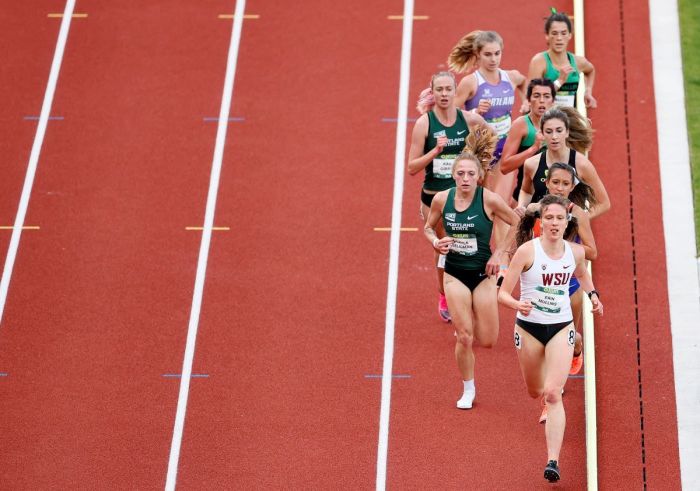Kentucky becomes 15th state to ban boys from competing in girls’ sports
Legislature also overrides veto on 15-week abortion ban

Kentucky has passed a law that prohibits biological males from participating in girls’ sports, with the Republican-controlled legislature overriding a veto by Democrat Gov. Andy Beshear.
Known as Senate Bill 83, or the "Fairness in Women’s Sports Act," the legislation would mandate that students can only participate in sports that correspond with their birth sex.
The biological sex of the student-athlete would be determined either by their original birth certificate or via a sworn affidavit by certain medical professionals.
Although Beshear had vetoed the bill last week, the veto was overridden by the state legislature on Wednesday, with a vote of 29-8 in the Senate and 72-23 in the House.
The American Principles Project, a conservative group that has advocated for similar legislation in other states, released a statement celebrating the overriding of the governor’s veto.
“Kentucky lawmakers made the right decision in overriding this veto in order to protect their state’s female athletes,” stated APP President Terry Schilling.
“We commend them for standing up in defense of a fair playing field for women and girls, and we continue to encourage leaders in other states without such protections to join this rapidly growing movement to protect women’s sports.”
The Kentucky chapter of the American Civil Liberties Union denounced the overriding of the veto, with spokesperson Samuel Crankshaw stating that the new law “violates students' Constitutional rights to equal protection and privacy.”
“It also violates Title IX of the Civil Rights Act by imposing a wholesale ban on transgender girls from participating in athletics consistent with their gender identity,” said Crankshaw in a statement.
“Similar bans have been blocked in federal courts in Idaho and West Virginia. A challenge to including trans girls was dismissed in Connecticut.”
In his veto message last week, Beshear contended that the new law is unnecessary due to preexisting standards enforced by the Kentucky High School Athletic Association.
These standards, as noted by the governor, require student-athletes to participate in the sports that correspond with the sex listed on their birth certificate, with some exceptions for students who undergo "sex reassignment after puberty" by taking cross-sex hormones.
“KHSAA has approached the issue of transgender sports participation with nuance, collaboration and a sense of fairness that would allow transgender children the opportunity to participate in sports without disturbing the competitive balance,” said Beshear.
“KHSAA policy requires that a student-athlete who has undergone sex reassignment after puberty must take hormonal therapy in a verifiable manner and for a sufficient length of time to minimize gender-related advantages in competition, and if the student-athlete stops taking hormonal therapy they must participate in the sport consistent with their birth gender.”
With the veto override, Kentucky becomes the 15th state to pass a law barring biological males from girls’ sports. The other states are Alabama, Arkansas, Arizona, Florida, Idaho, Iowa, Mississippi, Montana, Oklahoma, South Dakota, Tennessee, Texas, Utah and West Virginia.
The veto was among over two dozen vetoes the state's legislature overrode on Wednesday. Another bill that was passed into law was H.B. 3, which bans most abortions after 15 weeks gestation but provides exceptions for the life or health of the mother. The bill also bans mail-order abortion pills and requires doctors to have admitting privileges at local hospitals.
Gov. Beshear vetoed the bill last week, voicing concern about the bill not including exceptions in the cases of rape and incest. He argued that the bill would be deemed unconstitutional.
The Kentucky abortion bill is similar to Mississippi's 15-week abortion ban, the legality of which the U.S. Supreme Court heard oral arguments on late last year and is expected to issue a ruling in the coming months. The case provides the conservative-majority high court a chance to alter the legal precedent set in the 1973 case of Roe v. Wade, which made abortion a national right.
"Like most Americans, Kentuckians want commonsense safeguards for unborn babies and their mothers and reject abortion on demand," Marjorie Dannenfelser, president of the national pro-life lobbying organization Susan B. Anthony List, said in a statement. "We thank all our allies who fought to get this legislation across the finish line, and we hope the U.S. Supreme Court will soon allow the people and their legislators nationwide to enact laws that save lives.”
Planned Parenthood, the American Civil Liberties Union and the American Civil Liberties Union of Kentucky have announced their intentions to file a lawsuit against HB 3. In a statement, ACLU argued that the bill "effectively bans abortion care in Kentucky as of today."
The groups contend that the new law creates "unnecessary abortion requirements" that make it "impossible to comply with given the immediate effective date of the law, forcing providers in the state to stop offering abortion care services."
"Because the law is impossible to comply with, it amounts to a de facto abortion ban, violating patients’ federal right to abortion care under Roe v. Wade," the ACLU statement reads.





























